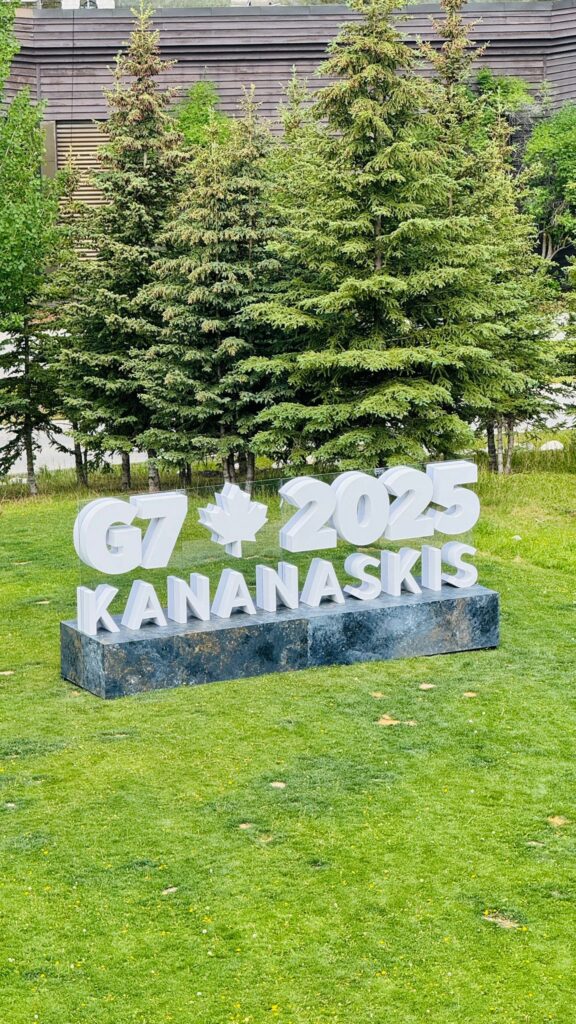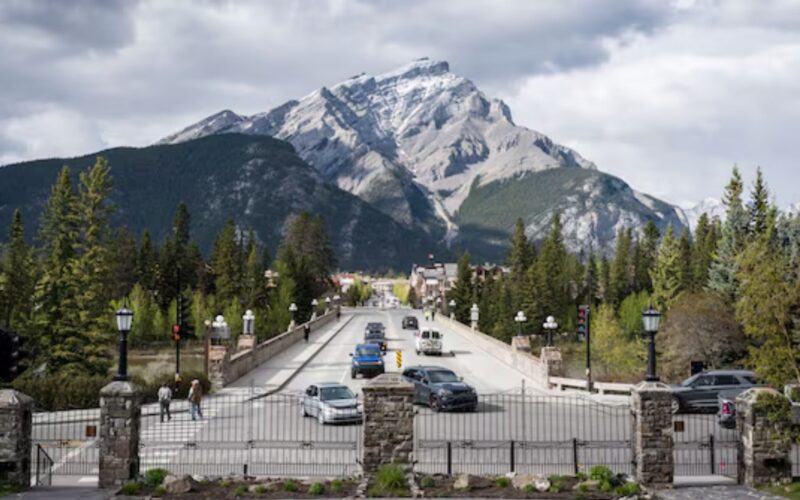Kananaskis, Alberta (Rajeev Sharma): World leaders are converging in the Canadian Rockies for the 51st G7 Summit, a high-stakes gathering overshadowed by surging violence in West Asia and ongoing tensions over U.S. trade policy. The summit, hosted by Canadian Prime Minister Mark Carney from June 15–17, is expected to be anything but routine, with geopolitical tensions rising and U.S. President Donald Trump once again in the global spotlight.
British Prime Minister Keir Starmer, en route to the summit, confirmed that he has spoken with Trump, Israeli Prime Minister Benjamin Netanyahu, and other leaders to urge de-escalation in West Asia. The UK is also deploying Royal Air Force jets and additional reinforcements to the region.

“We have long-standing concerns about Iran’s nuclear ambitions,” Starmer said. “While we recognize Israel’s right to self-defence, we are clear that this must de-escalate — the risk of a regional conflagration is very real.” He also indicated that the summit would include “intense discussions” on the matter.
Canada Scraps Joint Communique Tradition
In a notable departure from tradition, host PM Carney has opted not to issue a final joint communique, a decision reflecting the difficulty of achieving consensus among the deeply divided group, particularly with Trump’s presence.
Instead, the three-day summit in the picturesque town of Kananaskis, Alberta, is expected to be dominated by behind-closed-doors bilateral meetings. Multiple leaders are hoping to personally dissuade Trump from pressing ahead with controversial new tariffs that threaten to destabilize global trade.
Trump Remains the Wild Card
President Trump, arriving late Sunday, remains an unpredictable force. His recent remarks, including provocative statements about turning Canada into the “51st U.S. state” and acquiring Greenland, have unsettled allies.
In a symbolic move, French President Emmanuel Macron stopped in Greenland en route to Canada, meeting with the territory’s leadership and Danish officials aboard a naval vessel. Though Macron and Trump once enjoyed a brief diplomatic rapport, France is now facing looming U.S. tariffs and diminished security guarantees for Ukraine despite Macron’s repeated lobbying efforts.
Trump’s re-entry into the G7 has reawakened memories of the 2018 summit in Quebec, where he abruptly withdrew support for the final communique and called then-PM Justin Trudeau “weak and dishonest.”
“Trump prefers one-on-one interactions over the large roundtable format,” noted Peter Boehm, Canada’s former G7 sherpa. “He uses bilateral meetings to apply pressure, and that’s what makes this summit so delicate.”
Indeed, Trump’s private sit-downs have proven fraught in the past. He has reportedly used them to intimidate leaders, including those of Ukraine and South Africa. Nevertheless, several new leaders, including Starmer, are expected to pursue direct dialogue in hopes of avoiding a trade rupture.
A Growing Global Guest List
To broaden the summit’s reach, Carney has invited several non-G7 leaders, including those from India, Ukraine, Brazil, Mexico, South Korea, Australia, South Africa, and the UAE. Avoiding U.S. tariffs is likely to dominate conversations among this extended group as well.
Starmer, despite his political differences with Trump, has cultivated a cordial relationship. Earlier this year, he hosted the U.S. president for a warm Oval Office meeting, sweetening ties by extending an invitation from King Charles III for a future state visit to the UK. The two nations have already announced a preliminary trade deal slashing tariffs on UK automobiles, steel, and aluminum, though it has yet to be implemented.
Still, Starmer’s charm offensive has sparked awkwardness with Canada, a fellow Commonwealth nation. He has faced criticism at home and abroad for failing to publicly rebuke Trump’s “51st state” comments. When pressed by reporters, Starmer diplomatically sidestepped specifics, saying: “Canada is an independent, sovereign country and a much-valued member of the Commonwealth.”
Ukraine and the Trump Factor
Ukrainian President Volodymyr Zelenskyy is scheduled to attend the summit and meet with Trump — a reunion following a tense Oval Office meeting that reportedly left Ukrainian officials wary of engaging with the U.S. president. Security in Eastern Europe, NATO dynamics, and the future of U.S. support for Ukraine are all expected to surface during the summit.
Ahead of the event, Starmer visited Carney in Ottawa, the first British prime minister to visit Canada in eight years, where the two leaders focused on trade and regional security.
Despite the anticipation of sharp disagreements, German officials pushed back against speculation that the summit would devolve into a “six-versus-one” standoff, noting that internal differences within the G7 are often more complex than they appear.
Former Canadian PM Jean Chrétien offered advice to current leaders: don’t take the bait. “Trump tends to be a bully,” Chrétien said at a panel discussion this week. “If he wants to make headlines by acting out, let him. Just carry on as normal.”
A Summit That Could Reshape the Global Order
As the world reels from escalating conflict and economic uncertainty, the 2025 G7 Summit is shaping up to be a litmus test for international diplomacy. Whether it yields agreements, avoids disasters, or descends into chaos may largely depend on how world leaders manage, or contain, President Trump.
With bilateral negotiations underway and multiple crises competing for attention, the summit may not deliver a unified front, but it will certainly offer a revealing glimpse into the current state of global leadership.

